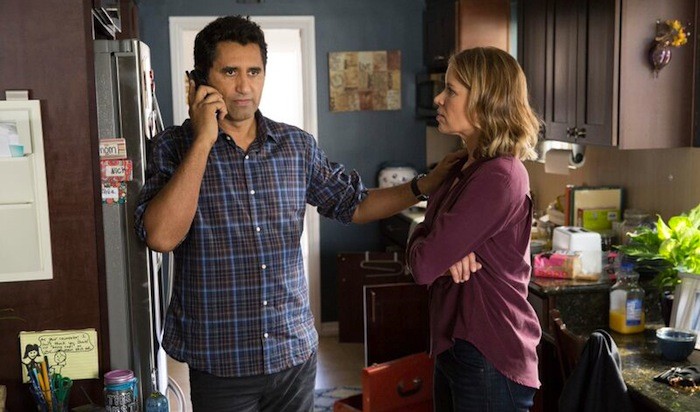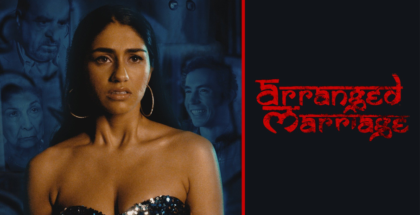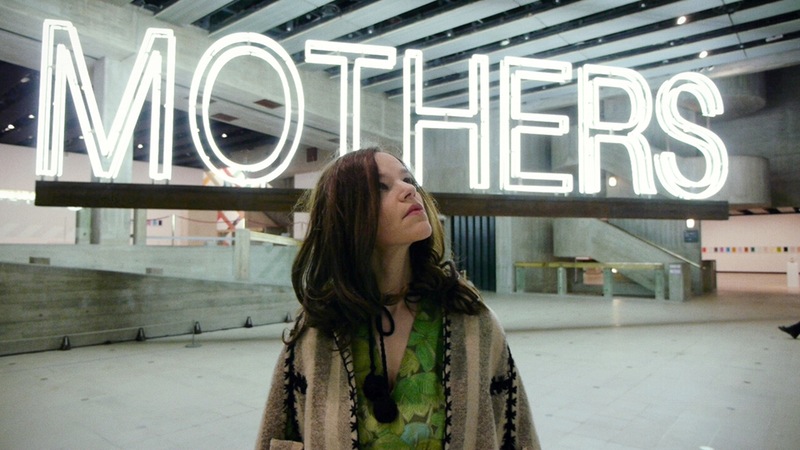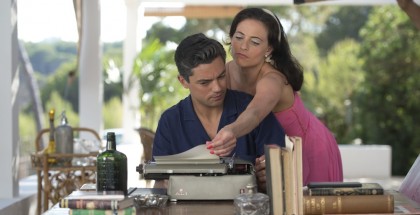UK TV review: Fear the Walking Dead (Season 1)
Review Overview
Uncertain danger
8Naive response
7Shallow humans
5David Farnor | On 04, Apr 2016
It’s just another weekday afternoon. The sun is out. The house needs cleaning. The army are patrolling ready for the evening curfew that stops anyone going outside. And outside the perimeter of the safety zone, dead bodies keep coming back to life. Travis (Cliff Curtis) and Madison (Kim Dickens) bicker in the kitchen, like any couple. “This is not normal,” Alicia (Alycia Debnam-Carey), their daughter, shouts at them. “Stop acting like it is.”
Fear the Walking Dead is at its best when chronicling that slow slide from normality into, well, the sheer abnormality of a full-on zombie apocalypse. It’s something that AMC’s The Walking Dead can never do. Everyone in that show, after all, is used to the undead already. At no point does one survivor to another, “So, zombies, eh? That’s a bit weird.” It would be a laughable thing to say. But it was laughable way before the corpses hit the fan too – nobody ever wants to be the first mad idiot to cry wolf. Someone, however, had to be.
That someone is Nick (Frank Dillane), brother of Alicia and step-son of Travis, who finds himself on the wrong side of a car bonnet all too easily – understandable, once you take into account the fact that he’s just woken up in an abandoned church surrounded by bodies and blood. The end of days, the wonderfully grim prologue seems to say, is now upon us. But this horror prequel is in no rush to get the party started.
Nick, it turns out, is a junkie, something that makes him a far-from-reliable witness. His terror is plain to see, from Dillane’s panicked run to his gritted teeth, but he’s not the kind of guy you believe when he starts raving about people coming back to life. And so, rather than immediately accepting the outbreak of walkers, or asking what humans should do next to survive, the script starts with a more interesting question: Is Nick imagining it? Dillane does dodgy well, even when strapped to a hospital bed, and director Adam Davidson (who helms the first three episodes of the six-part series) builds the initial chapter around that uncertainty: figures on the edge of the frame perpetually shuffle towards us; an elderly man behind a curtain wheezes a little too often; a boy at the school where Madison teaches brings a weapon to class, but not because of bullies.
It’s a wonderful demonstration of restraint, forever daring us to expect the worst, before undermining those assumptions. Calvin, a friend of Nick’s, seems a fine, upstanding gentlemen, but turns out to have a nasty side – one that doesn’t have anything to do with grave-robbing. Alicia’s boyfriend, Matt, has come down with a severe illness, but that doesn’t mean he’s necessarily been infected. Or does it?
Things inevitably start to happen that are irrefutable, from the police shooting a homeless man in the street who just won’t stay down, to neighbourhood birthday parties descending into the wrong kind of buffets – but that sense of uncertainty lingers, not in terms of whether to believe the shocking things that are happening, but in terms of how to react. These, after all, are not people who are used to murdering to survive – when they meet someone with a bite on them, they don’t put them out of their misery, instead wondering what to do to help, or whether just to leave them to recover. The show continues to play upon that hesitancy, which is fused with a topical edge – the above police brutality goes viral on YouTube, but also prompts a protest among young people, only adding to the feeling of wider unpreparedness. When zombies are clawing at your guts, some placards ain’t gonna save anyone.
That protest also allows us to meet Chris, the son from Travis’ first marriage, leading the show to adopt that time-honoured survival thriller trick of splitting its cast into two halves. And so Travis heads to find his son, only to huddle with ex-wife, Eliza, in a barber shop mid-social breakdown – and Madison, at home with Alicia, faces an equally nail-biting sequence, as their white-picket-fenced street gives way to dogged mayhem.
By breaking down the family into smaller chunks, Fear the Walking Dead gets the chance to examine the shift in each person’s behaviour, from the still-drug-taking Nick to the mostly hapless Travis. Dickens’ Madison emerges as the strongest player on the pitch, nicking a crowbar from school and getting involved in several tussles before the first season is out – she’s the first sign of someone who would actually be able to survive on The Walking Dead for real.
But it’s mostly a study in lack of changed behaviour that underpins Fear the Walking Dead’s eerie, unique tone – halfway through one set piece, we see our characters playing Monopoly, a disjoined and weird sight that should be ridiculous, but actually winds up being oddly believable, as the group cling to anything that feels old-fashioned and safe.
It’s a tough line to tread, though. Eliza and Madison’s dislike of each other could be straight out of a soap opera, reinforcing the idea of convention being upended by unconventional circumstances. Travis, on the other hand, is so busy trying to be the Good Guy and a Man of the People that he forgets to have a character; Curtis’ performance is as bland and neutral as Swiss Weetabix. Compare his actions to the radical steps taken by Griselda, a fellow father and traveller Cliff picks up during his stint at the barbers, and a there’s a nice array of reactions to the outbreak, at least. But in trying to build up dramatic tension through the ensemble’s lack of awareness, Fear the Walking Dead also struggles to give its humans enough depth to make them engaging – after several seasons of The Walking Dead, there’s rich territory to explore here, but it’s territory that risks the characters becoming more stupid than naive.
When the army move in to maintain peace and order, for example, there’s a neat line in distrust of the military that shows the kind of social commentary that Fear the Walking Dead can offer, but it’s undermined by the introduction of a relationship between Alicia and a soldier, which is far too cliched to be engaging. That reliance upon familiar family dynamics and tropes often winds up with people seeming more generic than relatable; we should be rooting for them, but it’s hard to when they seem so shallow and mundane.
The fact that the show’s first season is only six episodes works hugely in its favour, allowing the series to get these kind of teething problems out of the way before other teething problems (those involving jaws chomping on flesh) become a more pressing concern. Indeed, these initial chapters culminate in a nicely crafted scenario that brings Nick into contact with Victor Strand (Colman Domingo), the second person we meet who could convincingly survive life after the apocalypse. He’s prone to waxing philosophical while trapped behind bars in an army camp, but once out, becomes a slippery menace, all too willing to lie and cheat just to get back to his own home. There’s a whiff, here, of individuals betraying each other to survive, the first signs of people becoming the real monsters. Combined with a surprisingly emotional climax, Strand leads us to a payoff that reiterates the potential this prequel has to become a gripping companion piece to The Walking Dead. From the dull everyday of the present to the dark apocalypse of tomorrow? Season 1 of Fear the Walking Dead certainly has the first part right. Sometimes, a little too right.
Fear the Walking Dead Season 1 is available to watch online on Amazon Prime Video as part of a Prime membership or a £5.99 monthly subscription. For more information, see Where can I watch Fear The Walking Dead?.
Photo: Justin Lubin/AMC





















